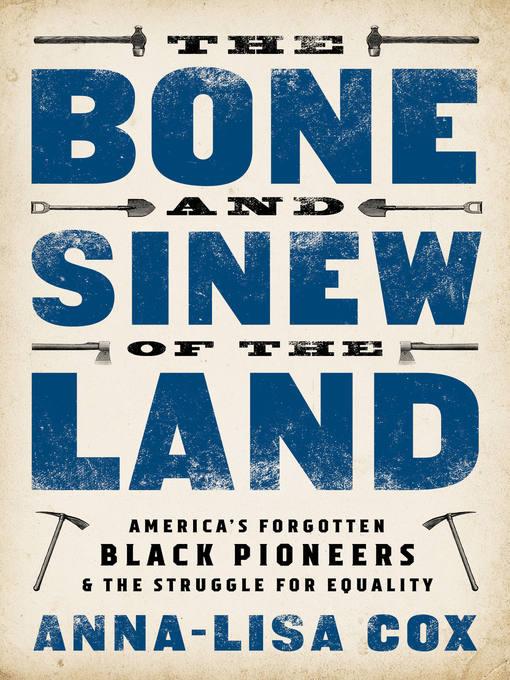
The Bone and Sinew of the Land
America's Forgotten Black Pioneers and the Struggle for Equality
کتاب های مرتبط
- اطلاعات
- نقد و بررسی
- دیدگاه کاربران
نقد و بررسی

April 9, 2018
In this engrossing narrative, historian Cox (A Stronger Kinship: One Town’s Extraordinary Story of Hope and Faith) restores attention to the role of African-Americans in shaping both the frontier and early- to mid-19th-century American political life. Tracing the paths of black settlers to the Northwest Territory—what became the states of Ohio, Indiana, Illinois, Michigan, and Wisconsin—Cox demonstrates how the growth of African-American populations in western cities and farmlands forced national questions about equality, citizenship, and the future of slavery. The frontier was a contested zone: although the territory was ostensibly slavery-free and granted voting rights to black male property holders, loopholes allowed pro-slavery Americans to ignore the law in pursuit of wealth and political power. Yet despite facing enormous prejudice, black pioneers fought for their rights and grew businesses, founded schools, built churches, and reorganized politics. Cox anchors her historical claims with portraits of black families living in settings ranging from rural Indiana to Detroit. Although her efforts to imagine settlers’ emotions and everyday lives, based more on speculation than archival evidence, may not be up to snuff for historians, they’ll enchant general readers. Cox’s book tells a story worth recovering, and it will interest anyone wanting to learn more about the lives of free black Americans before the Civil War.

April 15, 2018
Antebellum black communities in the upper Midwest emerge from the mists of history.By 1860, more than 63,000 African-Americans were living in the five states carved out of the old Northwest Territory, mostly in small farming communities. Many had moved there from the South and East during the territorial period seeking good land and the considerable freedoms guaranteed by the Northwest Ordinance of 1787. As the states from Ohio to Wisconsin were established, the black pioneers' legal status deteriorated as these "free" states stripped them of one legal right after another. While many of them prospered financially, their success proved both a rebuke to the notion that blacks were inherently incapable of thriving on their own and a temptation to their rapacious white neighbors. Greed, racial hatred, and the effects of the fugitive slave laws too often combined to produce incidents of harrowing violence. Cox (A Stronger Kinship: One Town's Extraordinary Story of Hope and Faith, 2006, etc.), a fellow at Harvard's Hutchins Center for African and African American Research, sets out to illuminate the experience of this community, the very existence of which has been generally overlooked or denied. Extensive endnotes attest to the thorough and diligent scholarship underlying her account. Along the way, however, the author appears to have been captivated by the stories of some of the families whose circumstances illustrate her thesis. She imagines their daily lives in detail--the rooster crowing as they pause in morning chores to admire the sunrise--and muses on what they may have been thinking or discussing; indeed, Cox often indulges in guesses about what her subjects could have done, might have thought, and must have known. The account thus often teeters on the edge of historical fiction. The prose style is more suitable for young adult readers than for scholars, and the author sometimes lapses into overwrought, florid passages.A scholarly study with a young adult novel trapped inside and struggling to escape.
COPYRIGHT(2018) Kirkus Reviews, ALL RIGHTS RESERVED.

May 15, 2018
Recent scholarship on the history of slavery, white supremacy, and domestic terrorism has expanded well beyond the bounds of the South, and Cox has made an excellent contribution with her latest book (after A Stronger Kinship). Here, the author addresses the old Northwest Territory or upper Midwest, one of the first areas of the country considered to be a frontier and settled by (ideally white) pioneers. This region was perceived to be a new promise of freedom after the American Revolution, but tensions became hostile after free blacks began to establish successful farms and businesses. The white backlash against them was horrific, and Cox uncovers both the legislative steps taken to undermine equality as well as the physical violence and terror whites in these new states inflicted on both free blacks and runaway slaves. The focus on some of these black pioneering families, including the Griers and Lyles of Indiana, drives the narrative with rich details about their struggles and triumphs. VERDICT A must-read for gaining a deeper understanding of the history of racism in the Midwest, particularly present-day Ohio, Indiana, Illinois, Michigan, and Wisconsin.--Kate Stewart, Arizona Historical Soc., Tuscon
Copyright 2018 Library Journal, LLC Used with permission.

June 1, 2018
For most Americans, pioneers evokes a clear image of hardy white men and women. Yet as Cox demonstrates in her carefully researched account, African American pioneers were active settlers from the time of the Revolution, with over 300 settlements in the Northwest Territory. As successful farmers, traders, and craftspeople, they took seriously the safeguards of equality professed by the Declaration of Independence, only to see state after state abandon those principles. In the Northwest Territory, originally established as a slavery-free zone, whites nonetheless enact fiendish legal maneuvers to maintain black dehumanization, depriving them of the rights to move freely, vote, and bear witness against whites, meaning that they couldn't testify against those who attacked or robbed them. Whites even maintained de facto slavery by forcing free African Americans into indentured service contracts with terms of over 90 years. Struggling to retain their farms and businesses, by the 1850s, free African Americans were trying to defend themselves on two fronts, for being too successful and for supposedly being doomed to failure. Cox provides a moving and necessary corrective to American pioneer history.(Reprinted with permission of Booklist, copyright 2018, American Library Association.)

























دیدگاه کاربران